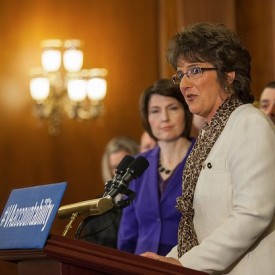Rep. Walorski Pens Letter to Trump on Tariffs

U.S. Rep. Jackie Walorski (R-Ind.) sent a letter to President Trump last week expressing concerns and sharing feedback from local manufacturers about his plan to impose tariffs of 25 percent on steel and 10 percent on aluminum.
“Early feedback from manufacturers in my district has me worried that immediate, blanket tariffs could reverse the economic recovery and return of manufacturing jobs to northern Indiana,” wrote Congresswoman Walorski. “In the 24 hours since the tariffs were announced, one manufacturer has already canceled a new plant in my district. The owner told me he ‘was expecting the savings on taxes to fund the expansion’ but after yesterday’s announcement, ‘the risk is too high with the tariffs.’”
A signed copy of the letter can be found here, and the full text is below.
Dear President Trump,
Since you took office, you have worked closely with Congress to rebuild our economy and military, protect American workers, and make our country stronger. With your leadership, we have passed historic tax cuts and rolled back the burdensome regulations of the Obama Administration.
We have sat at the same table twice in the last three weeks to discuss our shared goal of advancing your trade agenda and growing our nation’s economy. Both times, I urged you to approach these steel and aluminum cases with balance and nuance, and I continue to implore you to do so. However, I write today to voice numerous strong concerns that the tariffs announced yesterday could undo the incredible economic momentum that you have created.
The first concern is that early feedback from manufacturers in my district has me worried that immediate, blanket tariffs could reverse the economic recovery and return of manufacturing jobs to northern Indiana. In the 24 hours since the tariffs were announced, one manufacturer has already canceled a new plant in my district. The owner told me he “was expecting the savings on taxes to fund the expansion” but after yesterday’s announcement, “the risk is too high with the tariffs.”
Another manufacturer who competes against Mexican and Chinese companies told me that global tariffs would give his foreign competitors a further cost advantage – his wage costs are already almost seven times higher than theirs. His steel coil suppliers have been raising prices in anticipation of tariffs, and after yesterday’s announcement they told him to expect supply shortages, in addition to further price increases. The manufacturer is now in a catch-22:
“Price increases and supply disruptions will likely force my company to begin laying off employees just to survive. Efforts by us to pass on steel price increases to our customers will only encourage them to send their purchase orders to Mexico and China instead of [my company]. On the other hand, if we don’t raise prices…we will have less cash available to pay employee wages which will also lead to layoffs.”
The economy of Indiana’s 2nd District is driven by RV, trailer, boat, and other heavy manufacturers and their suppliers. 23.1 percent of the jobs in Indiana’s 2nd District are manufacturing jobs, the second-highest percentage in the country. Business is booming for them right now. In Elkhart County, for instance, the unemployment rate is 2.1 percent. However, they have already had to absorb rising labor costs due to the tight job market, and they worry that higher steel and aluminum costs could price many of their potential customers out of the market.
A second concern is that immediate, blanket tariffs could ignite a trade war, which could also impact my district. A Brookings Institution study found that parts of my district have among the highest export intensity (the export share of GDP) in the country. Of the 382 metropolitan statistical areas surveyed, Elkhart-Goshen ranks 4th, Kokomo 5th, Michigan City-LaPorte 48th, and South Bend-Mishawaka 64th.
Earlier this month, China suggested it could impose retaliatory tariffs on items like soybeans. Indiana is among the top soybean-producing states and exported $26.7 million worth of soybeans to China in 2017, which is over half of the state’s $49.4 million in total soybean exports. Canada, Mexico, the European Union, and others have also threatened retaliatory measures that would surely impact farmers, manufacturers, and workers in Indiana’s 2nd District.
A third worry is that immediate, blanket tariffs will upset ongoing negotiations on the North American Free Trade Agreement (NAFTA) and the U.S.-Korea Free Trade Agreement (KORUS) and imperil any potential future negotiations. You and I both share the goals of modernizing NAFTA for the 21st century, improving certain provisions in KORUS, and opening up new markets for American exports. All this would no doubt benefit Hoosier job creators, workers, and consumers. However, tariffs on these countries will cloud or even stall current negotiations and deter future negotiations, all of which would have the effect of holding these benefits hostage.
My final concern is that the proposed tariffs will hurt America’s global leadership. Again, we both want a strong, vibrant American economy and military. However, tariffs on all countries will necessarily mean tariffs on our allies and on our military supply chain. This would unnecessarily upset longtime and trusted allies, some of which are in volatile areas of the world, and would raise the cost of military equipment. Similar concerns have been voiced by Secretary of Defense James Mattis.
President Trump, we have many of the same goals: strong manufacturers, strong farmers, a strong economy, and a strong military. We have worked together on tax reform and regulatory relief to allow our manufacturers, farmers, and small businesses to grow. We have worked together to make critical investments in our military to reverse years of atrophy under the previous administration. And we have worked together to defend American workers and prevent their jobs from going overseas.
I am very worried that immediate, blanket tariffs, without regard to the nuances of industries and products, will undo this great work. I implore you to approach these tariffs with balance. Thank you for your consideration.
Sincerely,
JACKIE WALORSKI
Member of Congress

